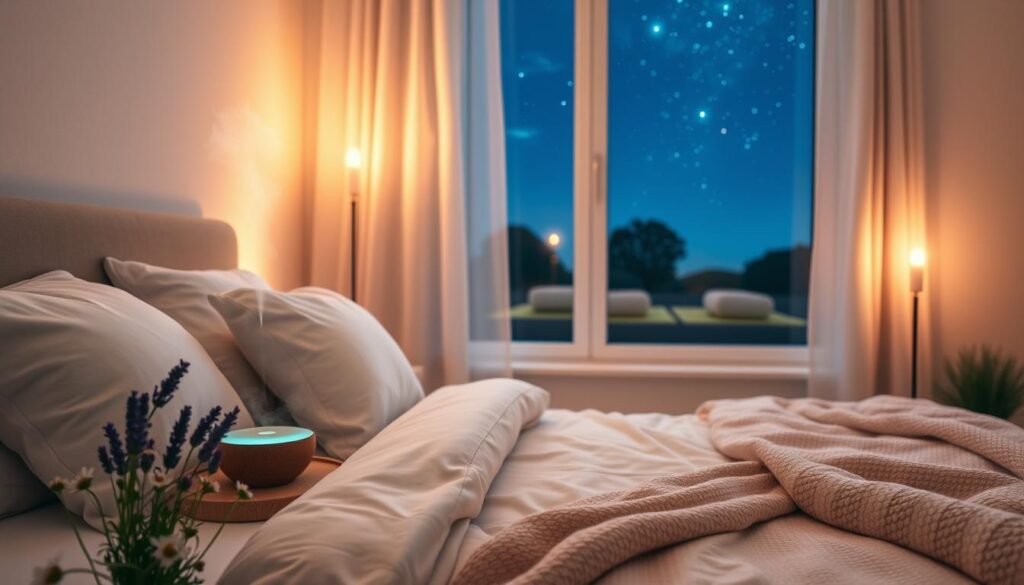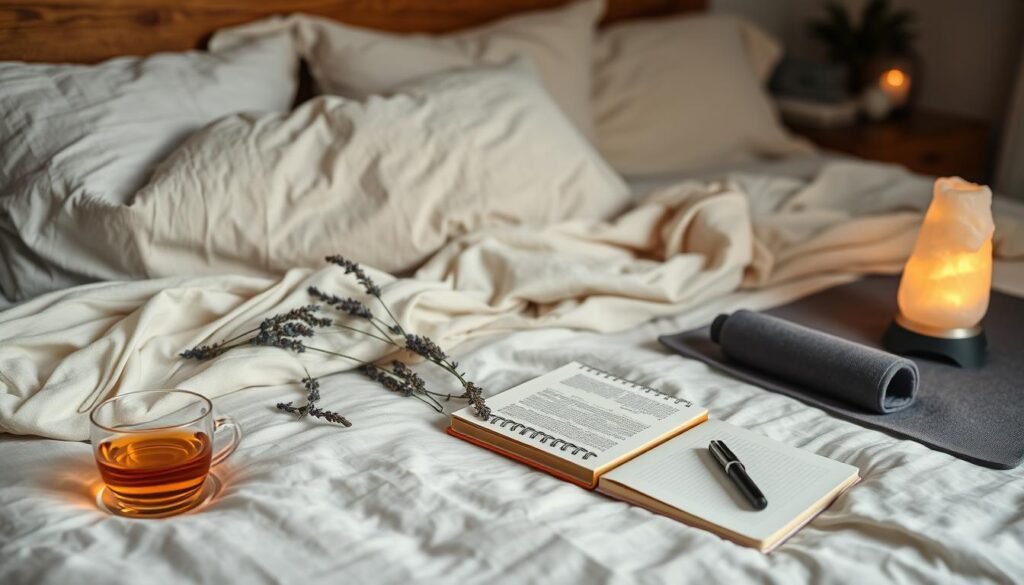Did you know nearly 70% of new parents battle with sleep troubles in the first six months? This high number shows how hard it is to overcome weaning insomnia. Cutting down on things like alcohol or certain meds can make sleeping hard. People may wake up a lot or feel they didn’t rest well. When trying to fix this, it’s important to learn about good sleep practices. This article talks about why people get weaning insomnia. It also shares tips to help you sleep better.
Key Takeaways
- Weaning insomnia is common for individuals reducing substance use.
- Establishing sleep hygiene is crucial for better rest.
- Consistent bedtime routines can enhance sleep quality.
- Natural remedies may aid sleep, but effectiveness varies.
- Professional help is available for chronic insomnia cases.
Understanding Weaning Insomnia
Weaning insomnia is tough for those ending breastfeeding or stopping substance use. It involves sleep issues that make getting good rest hard. Hormonal and emotional changes can interrupt sleep.
What is Weaning Insomnia?
Weaning insomnia happens when you stop breastfeeding or using certain drugs and can’t sleep well. This time may cause worry and mess up sleep patterns, making recovery hard. Changes in hormones like oxytocin and prolactin increase irritability and sleep troubles. People often struggle with insomnia treatment as they try to create new habits.
Common Causes of Weaning Insomnia
Many things lead to weaning insomnia, including:
- Hormonal shifts that affect mood and sleep
- Anxiety from stopping breastfeeding or drug use
- Sleep pattern changes due to meds or life adjustments
- Depression and other pre-existing conditions that worsen sleep problems
Also, not having enough support after weaning can make insomnia and mood issues worse. For tips on dealing with sleep maintenance insomnia, click here.
Impact of Substance Use on Sleep Patterns
Using substances like alcohol and opioids affects how we sleep. They mess up our body’s natural sleep cycle. People might find it hard to fall or stay asleep, or feel rested. It’s key to know this to help fix sleep problems and improve recovery.
How Substance Use Disrupts Sleep
There’s a clear link between using substances and not sleeping well. For example, 40 to 60 percent of people withdrawing from opioids struggle with sleep. Lack of sleep makes anxiety and irritability worse, which makes recovery harder. Many people getting help for addiction say sleep troubles are a big problem, connected to their drug use.
Alcohol users face similar issues. Between 35% and 70% of them have insomnia, much more than the general public. Only 15% to 30% of people without alcohol issues have these problems.
Withdrawal Symptoms and Sleep Deprivation
When stopping drug use, not being able to sleep can make cravings worse. It makes getting better harder. Research funded by the NIH HEAL Initiative found that suvorexant, an FDA-approved drug, helps. This drug works by fixing the sleep-wake cycle rather than just making you sleepy. It helps reduce withdrawal symptoms and cravings. This increases the chance of avoiding opioid use.

| Substance Type | Sleep Complaint Frequency | Withdrawal Sleep Issues |
|---|---|---|
| Opioids | 40-60% (Sleep deficiency) | Common |
| Alcohol | 35-70% (Insomnia) | Challenging to resolve |
| General Population | 15-30% (Insomnia) | Less frequent |
Fixing sleep issues is vital for recovery from substance use. Ongoing studies on treatments like suvorexant are important. They aim to improve recovery chances and help people find their way back to healthy sleep.
Sleep Hygiene: The Key to Better Rest
Good sleep hygiene is key to resting well at night and feeling better overall. To sleep well, adopting healthy habits is essential. These help your body relax and fight insomnia.
Establishing Healthy Sleep Habits
Keeping a regular sleep schedule is very important. Sleeping and waking up at the same time daily helps your body’s clock. Doing calm activities like reading or mindfulness helps prepare you for sleep. Avoid screens before bed because blue light affects melatonin, making it hard to sleep. For tips on a good bedtime routine, check this link.
Creating a Restful Sleep Environment
Creating the right sleep environment is crucial for sleep hygiene. It’s important to manage light, noise, and temperature to make your room comfortable. Keeping the bedroom dark and cool helps you sleep better. Removing clutter and distractions helps you relax and enjoy deep sleep. Making these changes can ease insomnia and boost your health and wellbeing.
Effective Bedtime Routines for Recovery
Setting up a nightly routine is key for better sleep, especially for those overcoming addiction. This routine boosts sleep hygiene and tells your body it’s time to relax. It keeps your body’s clock in check, aiding in easier sleep.
Why Consistency Matters
Sticking to a bedtime routine is essential for peaceful sleep. Irregular sleep can upset your body’s natural cycle. A consistent routine readies your body for rest. Doing the same things before bed every night creates a feeling of safety. This is very useful for anyone recovering from addiction.
Activities to Promote Sleep Before Bedtime
Adding calming activities before bed can really improve sleep. Here are some top suggestions:
- Gentle stretching: Helps relax the body and reduce tension.
- Journaling: Offers a way to process thoughts and feelings, potentially alleviating anxiety.
- Warm baths: Soothing baths can lower body temperature, signaling that it’s time for sleep.
- Reading: A good book can distract the mind from stressful thoughts.
- Meditation: Mindfulness practices help in calming the mind, making it easier to transition to sleep.
These activities don’t just improve sleep hygiene. They also help emotional health during recovery. To tackle insomnia, looking into cognitive-behavioral therapy (CBT) methods is key. Refer to research on effective sleep practices for more. A thorough bedtime routine eases sleep issues and supports recovery from substance use.
Relaxation Techniques to Combat Insomnia
Relaxation techniques are key for people with insomnia or sleep issues. Using these can better your sleep and health. Some top methods include:
- Mindfulness meditation: This kind of meditation helps you sleep less awake at night, especially with chronic insomnia.
- Deep breathing exercises: They lower your stress, helping you fall asleep easier.
- Progressive Muscle Relaxation (PMR): Known for fighting chronic insomnia, the American Academy of Sleep Medicine backs this method.
Adding these relaxation techniques to your day can help during stressful times. They also promote a peaceful mindset, which is good for sleep. A study in 2014 showed that mindfulness really helps people with sleep problems.
It’s also key to practice good sleep habits. Try to go to bed at the same time every day. Make sure your sleeping area is dark and quiet. And stay away from screens before bed. These habits, along with relaxation methods, offer a strong way to tackle insomnia.

Natural Remedies for Insomnia Treatment
Exploring natural remedies can help those battling insomnia. Many people look for alternatives to avoid the side effects of common sleep medications. Herbal solutions like valerian root and chamomile are gaining popularity for their sleep benefits.
Herbal Sleep Aids: Pros and Cons
Herbal remedies such as valerian root and chamomile are known for their soothing effects. Valerian increases calming chemicals in the brain, possibly lowering anxiety and enhancing sleep. Chamomile tea is also popular for its relaxing qualities and is used by many for better sleep.
- Pros: Users often experience fewer side effects than with traditional sleep pills.
- Cons: Results can vary, and some might have mild stomach upset.
The Role of Melatonin and L-Theanine
Melatonin, which helps control our sleep cycle, is a favored natural remedy. It’s especially helpful for those adjusting to new schedules or overcoming jet lag. Research indicates that doses between 0.1 mg to 5 mg are beneficial for older adults who have chronic insomnia.
L-Theanine, found in green tea, aids in relaxation without causing drowsiness. When used with other herbal aids, it can improve sleep quality and help with insomnia.

Professional Help for Chronic Insomnia
For those dealing with chronic insomnia, getting professional help is key. Cognitive Behavioral Therapy for Insomnia (CBT-I) is a top method. It changes sleep-related thoughts and actions. The American College of Physicians suggests it first for sleep problems.
Cognitive Behavioral Therapy (CBT) for Insomnia
CBT-I usually has six sessions, either weekly or every other week. These include different ways to beat insomnia. People learn to keep a sleep diary, set a sleep routine, improve bedtime habits, and think about reducing meds if needed.
It also tackles anxiety and teaches relaxation methods. This makes it a well-rounded treatment.
Studies show CBT-I works as well as sleeping pills, but with lasting benefits. Around 40 million Americans have insomnia, highlighting the need for such help.
When to Consult a Sleep Specialist
If insomnia continues despite your best efforts, see a sleep specialist. They create custom plans, maybe including meds or lifestyle adjustments. Insomnia hits women twice as much as men. And for those over 65, up to 65% can suffer from it.
| Aspect | Details |
|---|---|
| Recommended Therapy | Cognitive Behavioral Therapy for Insomnia (CBT-I) |
| Session Frequency | Weekly or bi-weekly for 6 sessions |
| Common Techniques | Sleep diary, sleep schedule, bedtime habits |
| Who to Consult | Dedicated sleep specialists after self-help efforts fail |
| Insomnia Prevalence in Women | Twice as likely as men |
| Insomnia Prevalence in Older Adults | 65% of individuals aged 65+ |
The Relationship Between Sleep Deprivation and Recovery
Sleep deprivation greatly impacts recovery in dealing with substance cravings. Not getting enough sleep makes it harder to stay sober. Sleep issues can make recovering from addiction tougher, leading to unplanned behaviors or even relapse.
Good sleep is key for controlling emotions and staying clear-headed. These are crucial for recovering successfully.
Effects of Poor Sleep on Substance Cravings
Poor sleep is closely linked to stronger substance cravings. Not sleeping enough can make someone want substances more, as it affects thinking and feelings. People with sleep problems are more likely to have strong desires for substances.
This can create a cycle that makes recovery harder.
Long-Term Benefits of Improving Sleep Quality
Better sleep brings many benefits for those recovering from addiction. It helps heal the body and improves emotional health. With good sleep, cravings decrease.
People can better manage their actions and choices. Over time, better sleep boosts energy, mood, and the ability to bounce back, aiding long-term recovery.
Strategies for Maintaining Healthy Sleep Habits
Healthy sleep habits are key to improving sleep quality and well-being. Creating a day-to-day routine helps enhance sleep hygiene. By choosing wisely throughout the day, one can make an environment that lessens insomnia. Regular exercise, getting enough sunlight, and eating well are crucial for better sleep.
Daily Activities That Support Better Sleep
Adding certain habits to your daily life can lead to better sleep at night. Exercise not just tires you out, but also lifts your mood and decreases stress. This, in turn, betters your sleep. Getting sunlight helps keep your natural sleep-wake cycle on track.
- Regular exercise, preferably in the morning or early afternoon.
- Consistent meal times to support metabolic functions.
- Minimizing caffeine and nicotine consumption, especially in the hours leading up to bedtime.
- Limiting screen time before sleep to reduce stimulation.
How to Avoid Relapse with Good Sleep Practices
Improving sleep might hit snags, so it’s key to have practices to prevent backslides. A calming routine before bed, such as reading or meditating, prepares your body for sleep. Identifying stress and managing it can protect your sleep quality.
Keeping your bedroom dark, cool, and quiet supports sleep. Knowing your sleep habits and maintaining a sleep journal can show where to improve. For more tips on enhancing sleep, you might want to check out these strategies.
Conclusion
Weaning off insomnia is a key step for people in recovery. They must start healthy sleep habits, like good sleep hygiene and a set sleep time. This helps them sleep better overall.
Stopping sleep meds can be tough, especially for long-time users. But, it leads to a lasting way to handle insomnia and recovery.
It’s vital to get professional help. Cognitive Behavioral Therapy (CBT) is effective for weaning insomnia. It provides strategies that meet personal needs. This tackles sleep problems, boosts overall health, and prevents relapse.
This path is more than dropping old habits. It’s about moving to a healthier lifestyle with better sleep. Resources and support, like the National Maternal Mental Health Hotline, help individuals handle their emotions during this change. They focus on well-being while stepping into a new life phase.